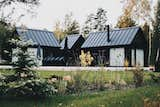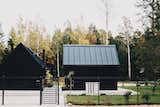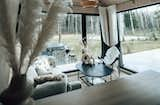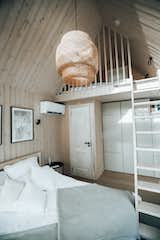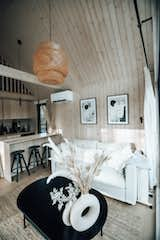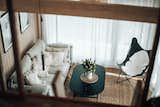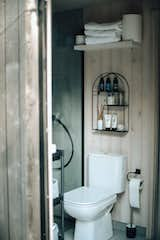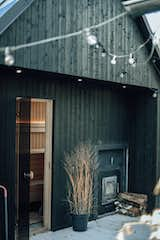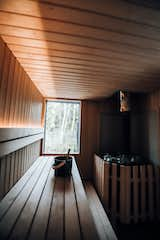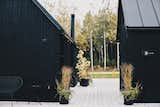After a decade of living abroad, Gunars Upatnieks, Ilze Upatniece, and their two children returned to their home country of Latvia, where they sought the perfect place to vacation outside Riga, the country’s capital.
“When we found a piece of land close to the beach, we knew—this is it,” says Ilze. “It’s very private, considering that it borders a beautiful forest. The are also nice neighbors, and it’s not too far from city.”
A family chose My Cabin to create a retreat in their home country of Latvia. The prefab structures have space for work, sleep, and relaxation.
The couple had a few stipulations for the home they wanted to build. Ilze works in renewable energy, so it had to be energy efficient. They were also interested in tiny living, but given that Gunars is an orchestra musician and university professor, they needed room for his double bass, a large, cumbersome instrument even in a regular-sized home. “I have to keep practicing, even in the summer,” he says.
They also wanted their young kids to be able to spread out, and the building process had to be able to happen without strict supervision, since they wouldn’t be able to visit the site regularly during construction. Essentially looking for a turnkey solution, they decided on prefab, and a local company offering a series of designs checked all the boxes.
The entire property took about a year to complete, since there were no hook-ups to water, sewage, or electricity.
Floor-to-ceiling glazing in the living area of the My Milla model keeps it connected to the landscape.
“When we visited the demo houses of My Cabin, we liked the idea of having three separate structures: a music house, a work house, and a sleeping house,” Ilze says. “In addition, the spatial planning and the design convinced us.”
My Cabin is a Latvia-based firm that’s been designing and building tiny prefab cabins since 2019. It debuted with a set of three cabins, and last year, introduced an expanded version of one of them called the Milla Long after the original My Milla. The structure is the same in terms of layout—a ground floor primary suite, a bathroom, a loft for an additional bedroom, and a kitchen with an island—but is expanded in size.
For their vacation property, Gunars and Ilze went with the company’s original cluster: the My Milla, My Kalmus and My Galia. They offer a combined 562 square feet of living space, while a terraced outdoor area with a sauna comprise an additional 1,700 square feet.
MyCabin delivers each structure with interior finishes completed, but owners have to furnish the space on their own.
“In the larger house, we have a fully equipped kitchen with an oven, refrigerator, dishwasher, a living area with a fireplace, and a relatively large bathroom with a walk-in shower and washing machine,” Ilze says. “Our daughter and son both sleep in lofts; hers is in the larger house, and his is in the smaller one, where we have a double bed on the ground floor.”
The cabins are connected by the terrace, and each has air conditioning and filtered water. With intentionally small living spaces, the emphasis is on the outdoors. Says Ilze, “We live close to nature, but it’s still very comfortable.”
After generating interest in Europe, My Cabin is setting its sights on the U.S., where it recently opened its first production facility in Chicago. As it lays plans to open additional facilities across the country, My Cabin joins a burgeoning prefab market that ranges from more tiny cabins to primary residences with Passive House certification.
“Our manufacturing partner in Illinois, PrefabPads, is helping us scale up,” says My Cabin founder and CEO, Girts Draugs, adding that interested buyers are welcome to tour the facility by appointment.
After a buyer’s permit is approved, My Cabin says it can deliver its cabins in two to three months, as long there is nearby infrastructure. Prices range from $37,500 to $140,000, depending on the model.
For Ilze and Gunars, it took a little longer to complete their retreat, since the site was remote. “Our property was a forest and didn’t have water, sewage, or other connections, so everything took about a year to come together,” Ilze says. “It was our first property to be completely designed and built from scratch, plus we coordinated most of the work from abroad, so it was a bit challenging at times.”
But the hard part is out of the way. “All of the natural materials make the house cozy, the built-in technology simplifies our life, and we have enough space to spend wonderful holidays there and create memories together,” she says. “We would choose this concept again and again.”

